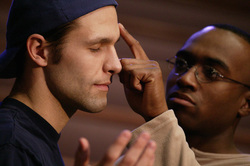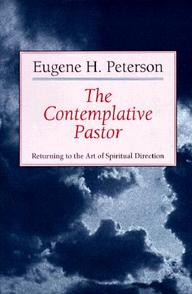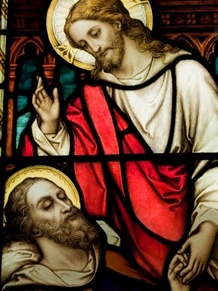
Let’s take a look at some old ideas that may be new thinking for many of us.
| Steve Stutz, D.Min, Spiritual Director |
|
 Here we are in December and preparing for the holidays. It’s a magical time of the year, despite the crass commercialism that has hijacked the season. One of the important issues which gets lost in the mix is the role of dreams in shaping the contours of the Christmas story. As a spiritual director, I am constantly working with people to better understand their dreams and often that involves doing a considerable amount of teaching on the subject, as well as undoing some bad theology and psychology that most of us have picked up along the way. Let’s take a look at some old ideas that may be new thinking for many of us.
3 Comments
 Have you ever given someone a gift and they used it recklessly, carelessly, or destructively? Can you remember when you gave a gift to someone who tossed it aside and didn’t even bother opening it? Can you think of a time when you gave a gift to someone and they didn’t thank you for it? How did that make you feel? Then there are other times that you gave gifts to someone and they were excited about opening it. Their eyes lit up when they took it out of the box, they said, “Thank you” and used it as you hoped they would. How did it make you feel? This is the way it is with God who has already given us a gift or gifts. Think of what might bring pleasure to His heart as He sees your use and appreciation for what he has given you. On the other hand, what would cause Him to feel hurt or disappointed? What if He saw that we just tossed our gifts aside unopened and unappreciated?  The Perfect Storm is a film about a fishing boat that was caught in a storm developed off the coast of Massachusetts from the confluence of a hurricane, a storm coming off the eastern seaboard of the US and a cold front dropping down from Canada. In the movie, they’re trying to push through the storm and at one point the captain decides the best chance for survival is to turn around and go back. whence they came. The plan is to go up the face of one of these 50 foot waves and turn the boat at the top, surfing back down. In the movie we get the scene in the wheelhouse where one of the crewmen and the captain survey the situation. The captain says, “Now, we’ve only got one chance at this.” And his mate says, “And if we don’t make it?” The captain replies, “Then we pray.” Unfortunately, that’s typical of the way many Christians approach life. If nothing else works, having exhausted all other remedies, all other options, and having tried everything else, we fall back on prayer. While for most people that may be normal, we’re NOT “normal” people–St. Peter says we’re a “peculiar people!” (1 Pet 2:9) Prayer should be our natural FIRST response to the character of a loving God who says, “This is what I’m like. Come to me. Ask what you will.” Prayer isn’t dead religious ritual but the natural response of a person alive with the Holy Spirit in a loving relationship with God.  Biographical Sketch of the Author Eugene Peterson is Professor Emeritus of Spiritual Theology at Regent College, Vancouver, British Columbia, Canada. He earned a Bachelor of Arts degree in philosophy from Seattle Pacific University, a Bachelor of Sacred Theology from New York Theological Seminary, a Master of Arts degree from Johns Hopkins and holds an honorary Doctorate of Humane Letters from Seattle Pacific University. In 1962 he founded Christ Our King Presbyterian Church in Bel Air, Maryland, where he served for 29 years. Peterson is a prolific author who is probably best known for The Message, his translation of the Bible. Summary of Contents Peterson organizes his text into three major sections. Under the heading “Redefinitions,” he provides four chapters in which he outlines his understanding of the character attributes of the pastor. Peterson argues that the noun “pastor” has become unintelligible to a modern audience and supplies a chapter on each of his three modifying adjectives (unbusy, subversive, apocalyptic). The middle section, “Between Sundays,” is an eight chapter discussion of the pastor's work throughout the week and how crucial it is for pastors to intimately know the congregations they serve. This section concludes with an account of Peterson’s sabbatical year in Montana. The third section, “The Word Made Fresh,” is a collection of fourteen poems Peterson composed on the topic of the Incarnation.  If your congregation is following the lectionary and your preacher doesn’t give in to American civil religion and pressure to focus on Independence Day or the SCOTUS ruling on the Affordable Health Care Act, the text you’ll hear from St. Mark’s gospel this coming Sunday (July 1) is about a healing performed by Jesus. It’s a great story that can really help mainline denominational congregations get a right understanding about "faith healing." The woman in this story had been plagued for twelve years with an uncontrollable hemorrhage. Not only was this a humiliating and discouraging condition, but also her disease made her ceremonially unclean which meant she was to have no human contact, no friends to encourage her through her dark days and nobody to celebrate with her on a rare good one. This woman was in a desperate place. She tried every remedy and every doctor, while spending all her money on treatments, only to find that none of her doctors could do the job. And then in an act of complete personal poverty she turned to Jesus. She reached out in desperation, believing in Jesus’ goodness and His power to heal. |
AuthorSteve Stutz earned his doctorate in spiritual direction and formation at the Houston Graduate School of Theology, where he is currently Adjunct Professor of Spiritual Direction. He received his initial training in spiritual direction through the Formation in Direction program of the Episcopal Diocese of Texas in 2006. He is a retreat leader and workshop presenter, having worked with groups in the US, Canada, and Africa. He is trained to facilitate the Ignatian 19th Annotation, is an expert in dream work, discernment process, and the charismatic gifts of the Holy Spirit. Archives
October 2013
Categories
All
|